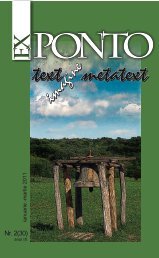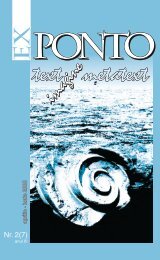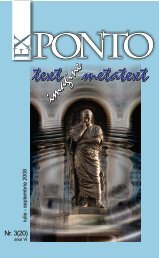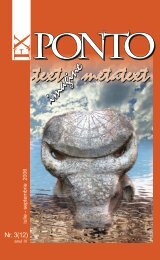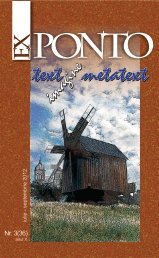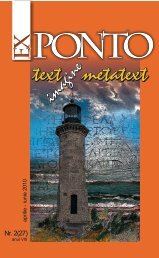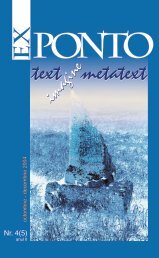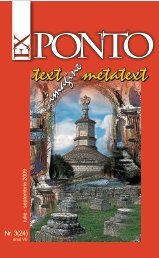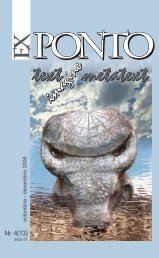Nr. 3 (32) anul IX / iulie-septembrie 2011 - ROMDIDAC
Nr. 3 (32) anul IX / iulie-septembrie 2011 - ROMDIDAC
Nr. 3 (32) anul IX / iulie-septembrie 2011 - ROMDIDAC
You also want an ePaper? Increase the reach of your titles
YUMPU automatically turns print PDFs into web optimized ePapers that Google loves.
Empire had brought the Swabs to the southwestern Romanian province of<br />
Banat. They were late arrivals to this space and distinguishable from the other<br />
German community of southern Transylvania known as Saxons, who had<br />
settled here in the 13 th century. Since the Swabs took their cultural dictates<br />
from Vienna rather then Bucharest, Romania’s capital, Muller chronicles a time<br />
of well-known political oppression, especially for the ethnic German minority,<br />
at the height of Ceausescu’s dictatorship in the 1980s. Specifically, Muller<br />
engages contemporary politics and history while miraculously incorporating<br />
narrative techniques as inventive strategies to circumvent the censorship<br />
imposed by Ceausescu’s draconic politics and by the Communist Partymandated<br />
socialist realism.<br />
Privileging literary devices that convey remembered experiences - from<br />
her father, a former SS who came from the war and until his death, caused<br />
by excessive drinking, sang songs to the Fuhrer, to her own student days and<br />
subsequent employment as a translator of manual instructions for hydraulic<br />
machinery to emigrating to Germany - Muller’s approach is not intended to<br />
depoliticize or dehistoricize the reality of Communist Romania; rather, it focuses<br />
on the specificity of the experience of Ceausescu’s repressive regime. 3<br />
Her sensitivity to the historical and political changes affecting Romania<br />
during the 1980s translates into seeing the world as an alien space. Her<br />
narratives allude to and mimic the atrocities of the Romanian police state and<br />
the country’s prison-like landscape. A novel like The Appointment is not only a<br />
miniature odyssey through a city sprung forth from the narrator’s imagination;<br />
it also brings forth the all-too-real site of deserted grounds where the Swabs,<br />
including Muller’s own grandparents, were deported in the early days of the<br />
Soviet colonization (1944-1958). In Muller’s account as told by her grandfather,<br />
such locations of the extended Romanian Gulag where entire families of<br />
deportees lived in holes they had to dig up themselves in the ground offer<br />
testimonies of the people’s suffering and degradation:<br />
Some four hundred and fifty families [were] dumped out in front of a wooden<br />
marker set in the middle of nowhere. Rows of stakes in dead straight lines, sky<br />
above, clay below, with nothing between but the damned crazy thistles and<br />
us. The sun scorched everything in sight. For several days your grandmother<br />
and I did nothing but dig ourselves a hole in the ground in front of our stake<br />
and cover it with thistles. The wind from the west was searing, and then the<br />
thirst, no water for three kilometers... Many of us lost our wits, one at a time<br />
or in couples, it didn‘t matter any more.<br />
In The Land of Green Plums, a novel that illustrates some of the atrocities<br />
of the Communist regime in Ceausescu’s time, the narrator is very close to her<br />
three German friends - Georg, who is sent to teach in an industrial town after<br />
graduating from college and later, after emigrating to West Germany, jumps<br />
out of a window in what may be a murder staged as suicide by the Securitate<br />
agents who have orders to kill even outside Romania’s borders; Edgar, sent<br />
to teach in a village after graduating from college and living a miserable life<br />
among his students who eat mulberries to improve their voices that sing<br />
hymns of praise to the Communist Party and who play soccer to improve their<br />
muscles and legs, even though their insides suffer from diarrhea caused by<br />
bad food and their outsides are covered with lice; and Kurt, sent to work as<br />
an engineer in a slaughter house who later hangs himself.<br />
But the characters who shape for the most part the script of Muller’s<br />
narratives are allegorical embodiments of women portrayed against the notions<br />
Ex Ponto nr. 3, <strong>2011</strong><br />
135




